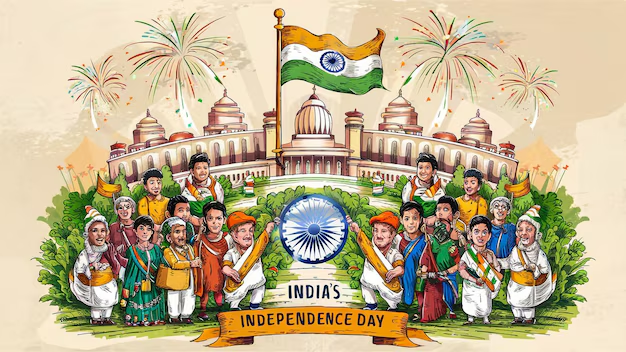
Rethinking Independence, Citizenship, and Civic Reason
GK & Current Affairs for CLAT | CLAT Current Affairs 2026
Powered by CLAT Gurukul – Best online coaching for CLAT
Introduction
As India celebrated another Independence Day, debates around the meaning of freedom resurfaced. Freedom, while often taken to mean independence from foreign rule, is much more than sovereignty. It is equally about internal civic liberties, institutional resilience, and the active role of citizens in shaping governance. The editorial “The Quality of Freedom” by Suhas Palshikar highlights the difference between mere military power and the deeper democratic freedom that sustains nations.
For CLAT Current Affairs 2026 preparation, this article is important because it touches upon political theory, constitutional design, freedom of speech, checks and balances, judicial accountability, and democratic dissent. These are recurring areas in both legal reasoning and current affairs sections of CLAT. At CLAT Gurukul, the best online coaching for CLAT, students are trained to connect such debates with the Indian Constitution, international law, and global democratic practices, thereby preparing them comprehensively.
Why in News?
- Independence Day Context: The discussion was published around India’s 79th Independence Day celebrations (2025), a moment when the meaning of “freedom” naturally comes into focus.
- Global Pressures: India is facing pressures from powerful nations like the U.S. and China regarding trade and international positioning, raising the question: what does freedom mean for a country amid global interdependence?
- Internal Concerns: Rising debates around free speech, judicial accountability, role of dissent, and shrinking civic spaces highlight how India’s internal democracy is being tested.
- Call for Civic Responsibility: The article emphasizes that freedom is not only about sovereignty but also about citizens holding governments accountable through dissent, protest, and public reason.
Thus, this article is in the news as it urges Indians to rethink the quality and substance of freedom beyond formal independence.
Point-wise Summary of the Article
- Definition of a Country’s Freedom
- Freedom at the national level means sovereignty: the ability to exist independently against global pressures.
- True freedom requires not only military strength but also economic self-sufficiency and independent decision-making.
- India’s External Challenges
- U.S. pressure on India over trade and Russia ties demonstrates how external actors influence India’s policy space.
- India’s stand on Pakistan also reflects how global powers judge nations not only by military capacity but also by economic stability.
- Freedom in this sense means the capacity to withstand global economic and political pressures.
- Internal Dimension of Freedom
- Freedom is not only about sovereignty abroad but also about citizenship rights at home.
- Civic freedoms depend on whether citizens can question authority, protest policies, and exercise freedom of expression.
- Institutions like judiciary, legislature, and media play crucial roles in sustaining this.
- The Role of Judiciary and Civic Freedoms
- When a judge rules against the Opposition leader, public disappointment shows declining faith in institutional checks.
- Freedom must not be reduced to mere procedural adjudication but should involve genuine protection of freedom of expression and dissent.
- Concept of the “Ideal Citizen”
- The state often expects a loyal, obedient citizen, whereas democracy requires a critical citizen who can dissent.
- Civic freedoms must include protest, criticism, and opposition — not just passive obedience.
- The Erosion of Civic Spaces
- Increasing pressure on opposition parties, protests, and free media is leading to shrinking civic space.
- Public marches or protests are often suppressed or ignored.
- This weakens democracy by silencing critical voices.
- Freedom as Diversity and Pluralism
- True freedom involves allowing diverse ideas, practices, and identities to coexist.
- Elections must not only be free but also create an environment where dissent is respected, not crushed.
- Freedom and Moral Foundation
- Freedom must rest on civic morality: the willingness of people to respect differing views.
- Historically, societies weakened when they tried to impose homogeneity of thought and suppress opposition.
Notes – Peculiar Terms Explained
- Sovereignty – The supreme authority of a state to govern itself without external interference.
- Civic Freedoms – Rights enjoyed by citizens, such as freedom of speech, protest, assembly, and dissent.
- Public Reason – A democratic principle that decisions should be justified through reasoning accessible to all citizens.
- Procedural Adjudication – A limited form of justice where courts decide technical matters without engaging the deeper principle of liberty.
- Critical Citizen – A citizen who actively questions and critiques government policies, rather than blindly obeying authority.
- Pluralism – The coexistence of multiple ideas, cultures, or practices within a society.
Legal and Political Context
- Constitutional Safeguards
- Article 19(1)(a): Freedom of speech and expression.
- Article 19(1)(b): Right to assemble peacefully.
- Article 19(1)(c): Right to form associations.
- These rights are the foundation of civic freedom.
- Judicial Precedents
- Kesavananda Bharati v. State of Kerala (1973): Established basic structure doctrine, protecting democracy.
- Shreya Singhal v. Union of India (2015): Struck down Section 66A of IT Act for violating free speech.
- These cases illustrate the judiciary’s role in defending the quality of freedom.
- Contemporary Challenges
- Increasing sedition and anti-terror laws against protesters.
- Allegations of censorship and suppression of dissenting voices.
- A global trend where democracies are becoming less tolerant of opposition.
Analytical Insights
- Freedom Beyond Independence
- India’s independence gave sovereignty, but sustaining it requires economic, military, and civic strength.
- Freedom and Democracy
- Without dissent, democracy risks turning into majoritarianism where only one viewpoint dominates.
- The Balance of Security and Liberty
- While security requires some restrictions, too many curbs weaken democracy and reduce citizens to passive subjects.
- India’s Current Position
- Internationally, India is pressured by both U.S. and China.
- Domestically, civic spaces for dissent and protest are shrinking.
- Both challenge the quality of India’s freedom.
Conclusion
Freedom is not merely the absence of foreign control but the presence of civic liberties, institutional resilience, and active citizenship. As Suhas Palshikar argues, India needs to focus not only on sovereignty but also on creating a critical citizenry that uses dissent, protest, and debate to improve democracy.
For CLAT Current Affairs 2026, this article is crucial as it links constitutional law, political science, and philosophy of freedom with practical global and domestic issues. At CLAT Gurukul, the best online coaching for CLAT, we emphasize this multidimensional analysis to prepare students for both exam success and civic responsibility.
The quality of freedom will ultimately depend not only on India’s strength against external pressures but also on how it nurtures internal democratic practices and civic liberties.
This Blog is Powered by CLAT Gurukul — India’s Leading Law Entrance Prep Platform
At CLAT Gurukul, we believe in empowering future legal minds with the right blend of knowledge, strategy, and mentorship. This blog is a reflection of our commitment to quality content that not only helps aspirants stay updated but also sharpens their conceptual clarity.
Why CLAT Gurukul?
- Personalized Mentorship by Top Legal Educators
- Comprehensive Study Materials & Legal Updates
- Daily Practice Sets, Mocks & Performance Tracking
- Result-Oriented Strategy for CLAT, AILET, and CUET
Whether you’re reading this article to deepen your understanding or to stay ahead in your exam prep — you’re already one step closer with CLAT Gurukul by your side.
Join thousands of successful aspirants who trusted CLAT Gurukul and cracked India’s top law entrance exams.
Visit https://www.youtube.com/@CLATGurukul/shorts to learn more or speak to our experts now!
Note from CLAT Gurukul
At CLAT Gurukul, we are committed to providing free CLAT study material, including CLAT current affairs, legal reasoning practice sets, general knowledge updates, logical reasoning questions, English comprehension exercises, and more — all curated by top mentors.
Our blog section is regularly updated with high-quality CLAT content tailored to match the evolving pattern of the CLAT UG exam. Whether you’re looking for CLAT 2026 current affairs, CLAT legal reasoning passages, or mock practice sets, we have you covered.
We believe in open-access learning and will continue to publish free CLAT preparation resources to help serious aspirants succeed.
Explore more free content under categories like:
Best online coaching for CLAT, CLAT current affairs, CLAT GK updates, CLAT legal updates, CLAT logical reasoning, and CLAT English preparation.
For structured learning, daily mocks, and expert mentorship, visit https://www.youtube.com/@CLATGurukul/shorts — the Best CLAT Coaching in Patna and India’s most trusted platform for CLAT online coaching.




